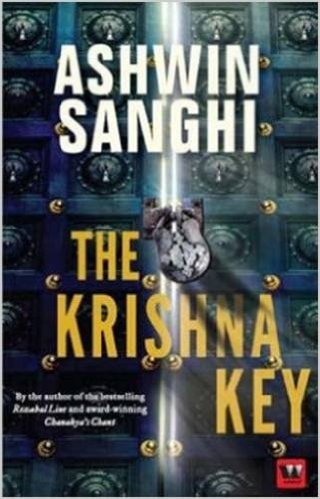I took more than a month to finish an unputdownable novel, which to be honest, is inexcusable. My friend, Shri J Mathur, was baffled, “How could you take so much time. I finished it in two days. And it was gifted by you, remember… and now you say you don’t have time!!” This was in-between thanking me profusely for introducing him to this new genre of suspense thriller. It had always been a pleasure to share with like-minded people what I found interesting and worth discussing and debating upon. It was rather overwhelming to know someone felt obliged by this not-so-altruistic-act.
True, lack of time was one of the pretensions I often resorted to, perhaps to cover up my other inadequacies. But as I put on my thinking cap to analyze this present shortcoming of mine several untouched factors peeped in from behind undrawn curtains of the mind.

Myth and Mythology go hand in hand. It is those unresolved premises of myths that timelessly evoke intrigue. Mythology feeds on this foggy feast gluttonously. From a litterateur’s view point, Mythology is a layered chronicle pivoting around larger-than-life characters. Krishna, is undoubtedly, the most awe-inspiring and dynamic persona of Indian Mythology. The quest, whether he is a figment of imagination of ancient narrators or truly the Divine Incarnate, has always led to more intricate queries. Time and again, we have also come across the premise that the King of the Cowherds may not altogether be just a fictitious entity. What if historical facts indicate his iconic presence in an epoch ravaged by political upheavals? Why is the birth-story of Christ so damned similar to the birth-story of Krishna? Will the edifice of Christianity inexorably crumble to dust if the West accepts its subordination to the oldest religion of the world? What is the basis of this conflict between Western Theologians and Hindu Mythologists over precedence and predating of religions? Is there a proven scientific explanation of all that has come to be known as pagan worship in Hinduism? Over and above, if all these seriously contemplative issues are tangled into one complex terrain of a chase and hunt thriller? Then what….?
Blurb: Ravi Mohan Saini, a well-known Professor of History, is charged of murdering his childhood friend, the famous Archaeologist Anil Varshnay. Saini flees with his favourite pupil Priya, from the clutches of the ruthless Police Inspector, Radhika Singh, aided by Priya’s father, Advocate Ratnani, in a desperate attempt to gather proofs to establish his innocence. However, those who can save him from being convicted are all murdered one after the other by an unknown assailant who somehow has clue to Saini’s every moment’s moves. Unfortunately, each murder points a finger at Saini. But what Saini does not know is that, in this macabre game of find and finish, he is merely a pawn in the hands of the mysterious Mataji and that the key to his innocence lies in the grip of none other than the formidable underworld don Sir Khan. Alas it’s going to be too late before Saini realizes that the name Sir Khan is just an anagram for Sri Krishna….
Does the plot ring a bell? By now, my readers must have already guessed that I am talking about none other than the Dan Brown of India – Ashwin Sanghi. Krishna Keys – the third of his trilogy – has distinct similarity with the path breaking Dan Brown sagas. The wrongly accused expert on the run for his life coming across serendipitous clues to his freedom which also at the same time open a floodgate of disputable and indisputable hypotheses which if accepted inarguably can topple the age-old beliefs of the masses upside down!!
Krishna Keys, as I said earlier, is a page turner, for those who are in the habit of gulping down a whodunit for the simple attraction of finding out who the culprit is which usually is the last chapter’s trump reveal. For an always questioning mind Ashwin Sanghi presents a maze-like matrix twined with a slew of conjectures and a volley of well-researched dig outs, which are at times unpalatable by virtue of their voluminous pile. From sacred Jyotirlingams to nuclear transmutation, from the epical battlefield of Kurukshetra to the contemporary Shining India, from the Godly Krishna, the multi-dimensional diplomat and astute king-maker to the harassed modern-day Historian, Ravi Mohan Saini grappling with a slew of mind-boggling factual as well as misleading data, the novel Krishna keys is stupendous in its sweep.
The redoubtable fact about Sanghi is the enormity of his read and research. His contribution to present-day Indian writings in English is trailblazing. He has pioneered and popularized a genre hitherto not much explored in Indian mainstream literature, though there are many who have later followed suit, to the point of saturation. Yet, I have certain permanent grievances against Sanghi:
- His plots are unnecessarily complex
- The barrage of information, though well researched, blurs the narrative
- The reader gets lost in the mesh of innumerable speculations leading to nowhere
- At times it is difficult to distinguish the story from documented finds
- There are numerous trails intertwined in the narrative which are left open-ended
- The climactic theory is most times either too simplistic, too oft-repeated or too unfathomable
- I personally have a definite abhorrence for his fondness for copious bloodshed and grim violence
- The gory flow of the story, thus, ends up being absolutely antithetical to the intent of the theme, which is designed to be subliminal in essence
- Sadly, the long-drawn nail-biting, edge-of-the-seat thriller, more than often, falls flat in the conclusive chapter, in the absence of logical demystification of conventional isms
The Krishna Key, especially, has unmistakable flavour of Paul Coelho too. As a reader, I fail to appreciate the forceful interjection and analogy of the legendary life-story of Krishna with the mainstream narrative of a wild hunt for Saini, the supposed perpetrator of serial crimes, who himself is more a victim than a victimizer. Again, there is nothing earth-shattering about the key-message of the story. As is usual with Sanghi, the theorems he propounds is more engaging than the story he tells. This time, he has overdone himself. The improbabilities and implausibility embedded in the storyline, to say the least, is appalling.
Having said all that, I still concede the fact that given a chance I may once again give his upcoming novel Sialkot Saga a try. And that goes a long way to define Ashwin Sanghi for you all.
Make it intelligent reading…










I absolutely agree about the complex plots and loads of information…
LikeLiked by 2 people
Thanks Maniparna for endorsing my views
LikeLiked by 1 person
I must acknowledge without any hitch that this review of yours is better than the book itself which though a page-turner, can be termed as overrated. All your listed grievances are agreeable Geeta Ji. While going through them, I was feeling as if my thoughts about the novel were coming out of your pen. Out of the trilogy of thrillers which has made Sanghi a bestseller, I liked The Rozabal Line the most. But its quality is also marred by information overload and unnecessary confusion spread by the author throughout the narrative. I have serious reservations about Sanghi’s most popular work Chankaya’s Chant. And as for The Krishna Key, your outstanding (yes, outstanding indeed) review says it all. I bow my head before the master reviewer, the one and only Geetashree Chatterjee.
Jitendra Mathur
LikeLiked by 1 person
Its great to read your comment and once again find how like-minded we both are, Mathur Sahab!! Thank you for your effusive appreciation.
LikeLiked by 1 person
It was a wonderful review, Geetashree! I agree with Mr Mathur, your reviews are far better than the original products at times!
One thing that rankled about Krishna Key was it’s close resemblance with ‘The Lost Word’ by Dan Brown. That was the reason I couldn’t complete it. The antagonist was exactly similar to Ma’lak in Mr Brown’s book and also some of the twists in the plot. However, after reading your review, I’ll give it a try again.
LikeLiked by 2 people
Thanks, thanks Rakesh. Originality in creativity is a rare product nowadays. Again we tend to get heavily influenced and impacted by our role models as well be it any sphere of life. Am sure Mr. Sanghi may resent your observations. But there it is.
LikeLiked by 2 people
I have not read any of his books but your review is very good… To the point and neat…
LikeLiked by 1 person
Thanks Jaish and welcome to my space.
LikeLike
It was a true core indepth honest review and that’s the best part. After full scrutiny the last line made the fine impression though.
LikeLiked by 1 person
Thanks Chaitali. You’ve made my day.
LikeLike
Thanks for the objective review Geetashree. The book seems to cover a broad spectrum ranging from jyotirlingam to nuclear reactors.
LikeLiked by 1 person
Yes, it does. Give it a try if you wish to do so.
LikeLike
Interesting site, will follow. Good luck with the page-turner! Glad you enjoyed my post https://davekingsbury.wordpress.com/2016/03/28/haikumania-the-results/
LikeLiked by 1 person
Thanks and welcome
LikeLike
I would suggest you share this review with Mr Sanghi…he should Thank you for these thoughts. This way we can help Authors improve.
LikeLiked by 1 person
I am not sure Alok he will like it. Thanks for showing so much faith in me.
LikeLiked by 1 person
A person who wants to know about his mistakes and learn from them would surely take it in good spirits.
LikeLiked by 1 person
I’m having this book for a long time and I guess, after reading your review, it’ll be kept as it is for some more time.
LikeLiked by 2 people
Hi Ravish. Don’t depend on my review blindly. Read it and form your own opinion. Views tend to be subjective.
LikeLiked by 1 person
Too complex a plot puts me off. Good review.
LikeLiked by 2 people
Yes, you are absolutely right. Great to have you on my posts.
LikeLiked by 1 person